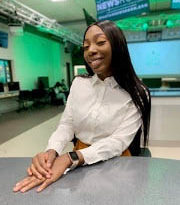The Knight Center for Environmental Journalism recently taught an online environmental journalism to a group of university students in Peru. This is one of the stories produced during that effort. The program was funded by the U.S. Embassy in Lima.
By Antonnela Bendaño Guzmán
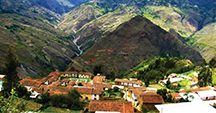
Meza J. (2022). “Arancay: A place that preserves its nature and customs”.
Arancay, located in the province of Huamalíes, department of Huánuco in Peru, derives its name from the genus of arachnid that abounded there because the Arampacay is similar to the common tarantula.
The town consists of an area of 158.33 square kilometers at an altitude of 3,050 meters with 2,053 residents.
In this town, you can observe its beautiful nature trapped in time, with its mountains, some covered with a nice green color, some reddish and others that stand out for the silvery glow of their rocks. Its vegetation is abundant, especially the huge eucalyptus, a medicinal plant widely used to treat colds.
Arancay is surrounded by the crystal-clear waters of the Marañon River with a dry temperate climate.
The place retains its nineteenth century architecture, adobe houses with wooden balconies and red roofs.
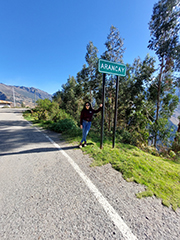
Arancay
When I visited in July 2022 for Peru’s national holidays, I was surprised by the warmth of its people and the fact that they still maintain their customs, such as the Huarahua dance Campish de Arancay which is a warrior dance.
There are also medieval competitions such as the race of ribbons on horseback and the bullfight in which they only play but do not kill. The most surprising thing about this place is that there is no pollution because there is little mobility of means of transport, which do not emit pollutants.
Talking with one of the inhabitants, he told me many stories and legends of Arancay. One of them is about the ruins of a place that people do not approach because they have seen a giant snake that guards it.
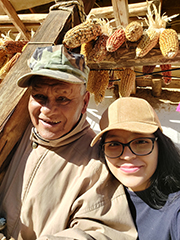 He also told me that, in the past, the inhabitants had to walk since there was no road, and to make a short trip, they had to pass by the edge of a lagoon called Negrococha lagoon. They gave it that name because in the middle is a black statue.
He also told me that, in the past, the inhabitants had to walk since there was no road, and to make a short trip, they had to pass by the edge of a lagoon called Negrococha lagoon. They gave it that name because in the middle is a black statue.
He told us that they stopped walking along the edge of the lagoon because people who passed by there disappeared, and even if they were tied up with rope, one of them always disappeared.
This could be described as a place to be visited, to breathe fresh air, to see a rainbow and at night to appreciate the brightness of the stars and constellations.
Finally, I acquired information about nature, environment, cultures and people, and I learned to write about my experiences in environmental journalism.
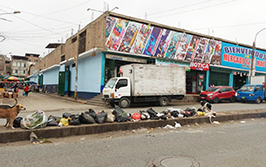

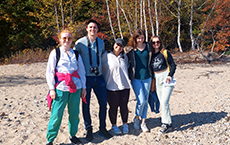



 He also told me that, in the past, the inhabitants had to walk since there was no road, and to make a short trip, they had to pass by the edge of a lagoon called Negrococha lagoon. They gave it that name because in the middle is a black statue.
He also told me that, in the past, the inhabitants had to walk since there was no road, and to make a short trip, they had to pass by the edge of a lagoon called Negrococha lagoon. They gave it that name because in the middle is a black statue. 